

SUBSCRIBE TO OUR FREE NEWSLETTER
Daily news & progressive opinion—funded by the people, not the corporations—delivered straight to your inbox.
5
#000000
#FFFFFF
To donate by check, phone, or other method, see our More Ways to Give page.


Daily news & progressive opinion—funded by the people, not the corporations—delivered straight to your inbox.
In a "historic" show of interfaith solidarity, 500 clergy members prayed along the banks of North Dakota's Cannonball River on Thursday where they "bore witness with the Standing Rock Sioux Nation," which has faced intimidation, violence, and arrests for protecting their sacred land and water supply from the threats of a massive oil pipeline.
According to the Episcopal News Service, "The interfaith group spent more than five hours on site, marching, singing hymns, sharing testimony, and calling others to join them in standing with the more than 200 tribes who have committed their support to the Sioux Nation as they protest the route of the Dakota Access Pipeline (DAPL)."
Later, roughly a hundred protesters and clergy members held a prayer circle on the lawn of the North Dakota state Capitol in Bismarck, forcing the police to order a lock-down of the building. "Highway Patrol Lt. Tom Iverson said 14 people were arrested in the Capitol's judicial wing for refusing to leave the building. Iverson said the protesters, who were holding a sit-in and singing prayer hymns, faced disorderly conduct charges," AP reported.
The below video was taken by local news station KRYR-TV:
Caro Gonzales, a Native American activist, told reporters that the water protectors had come to the Capitol to deliver a letter to Gov. Jack Dalrymple in support of the tribe and to ask "why he has ordered riot police to engage in police brutality at Standing Rock." Afterwards, a group of roughly 100 protesters marched from the Capitol to the governor's residence, where they were met by "dozens of riot police," Gonzales said.
Throughout the months-long standoff, Dalrymple, a Republican, has routinely sided with the pipeline company. After falsely declaring that the water protectors were risking public safety by engaging in "unlawful acts," he called a state of emergency, which paved the way for an increasingly aggressive and overblown police response to the peaceful protests.
On Wednesday, about 100 police in riot gear fired mace, pepper spray, and rubber bullets at point-blank range at water protectors praying waist-deep in water. The group of roughly 300 protectors had attempted to cross the Cannonball River to pray for the threatened land on the opposite side.
The week prior, more than 140 water protectors were arrested after police conducted a military-style raid of their encampment. Armed with tanks, a sound cannon, an armored truck, and bulldozer, the scene was described as "all-out war...waged on Indigenous protectors."
During the day of prayer Thursday, the clergy members marched to the bridge that was the site of last week's attack and "ceremonially burned a copy of a 600-year-old document," AP reported. Known as the Doctrine of Discovery, "the document from the 1400s sanctioned the taking of land from Indigenous peoples."
"It was very moving to be there in solidarity," said Philadelphia-based Bishop Dwayne Royster. "I wanted to be present as an African-American clergy person to let the people at Standing Rock understand that we as African Americans need them to know that we stand with them in their fight."
Similar acts of solidarity, particularly by people of faith, have grown in recent days. On Wednesday, nine rabbis, rabbinical students, and Jewish community members were arrested in Philadelphia for staging a civil disobedience action at a downtown TD Bank, one of the biggest financiers of the pipeline project. Nearly 300 rabbis have signed a statement in opposition to Dakota Access.
As the pipeline's construction edges closer to the Missouri River, which the Standing Rock Sioux is hoping to protect, with little hope of abatement, pipeline opponents worldwide are planning a mass Day of Action on Nov. 15, asking the U.S. Army Corps of Engineers and the incoming U.S. president "stop the Dakota Access Pipeline--and all those after it."
The call to action reads:
The Army Corps fast-tracked the Dakota Access Pipeline without proper consultation, and as a result, bulldozers are approaching Standing Rock as we speak. But with coordinated, massive demonstrations across the country, we'll make it clear that this powerful movement will not allow the Obama administration or the incoming President to sacrifice Indigenous rights, our water, or our climate--they must reject this pipeline.
Episcopal News Service photographer Lynette Wilson shared a number of moving photographs from the day of prayer.
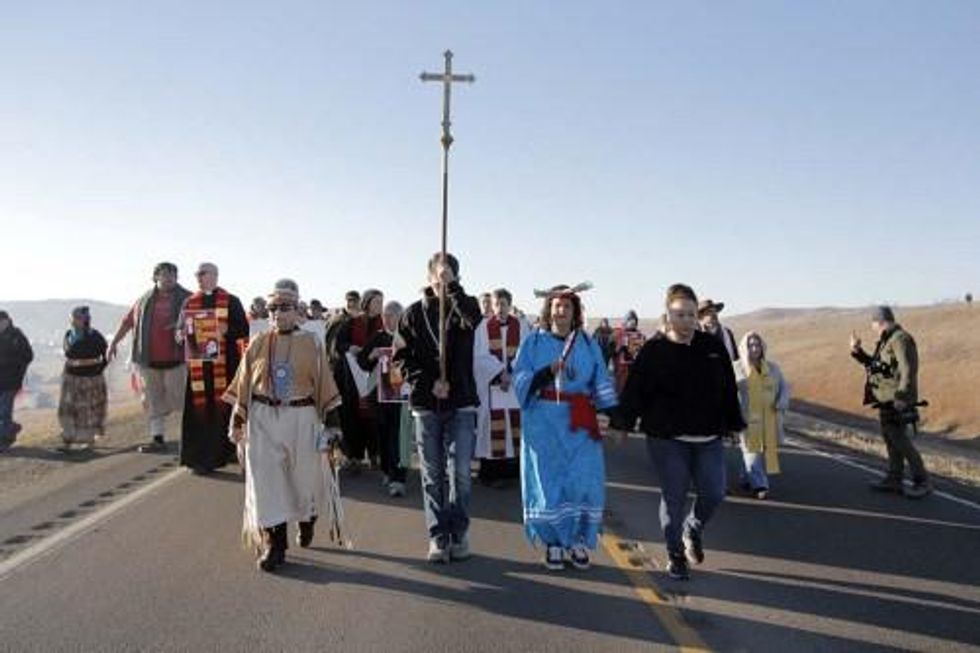
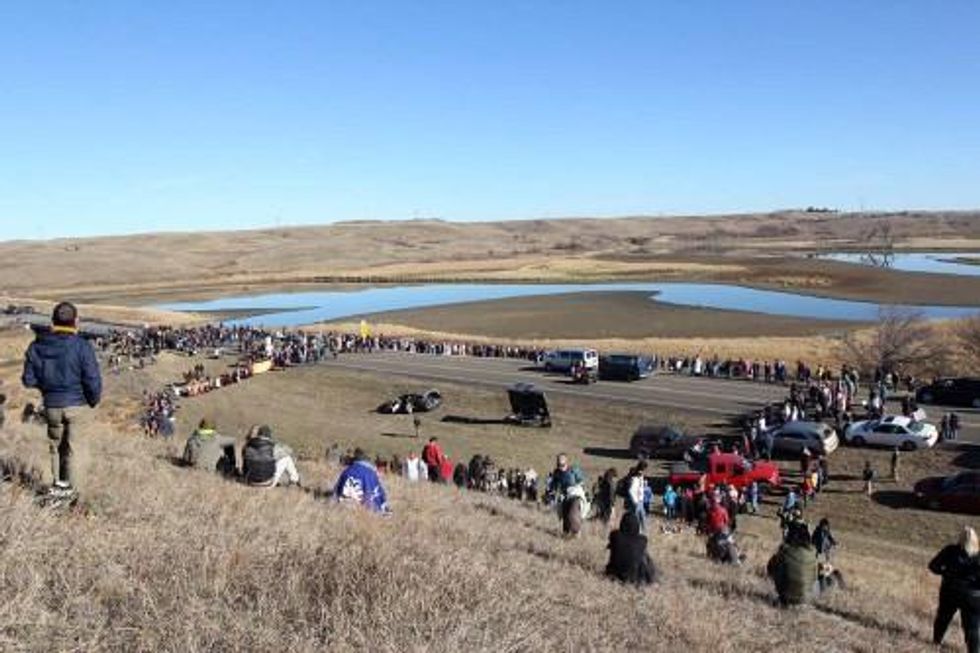
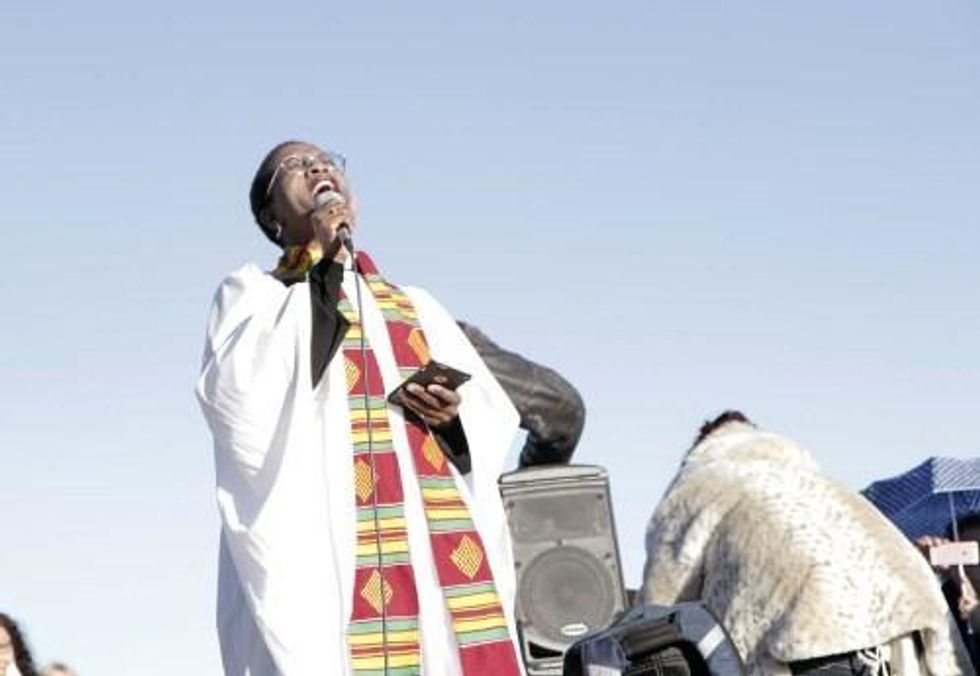
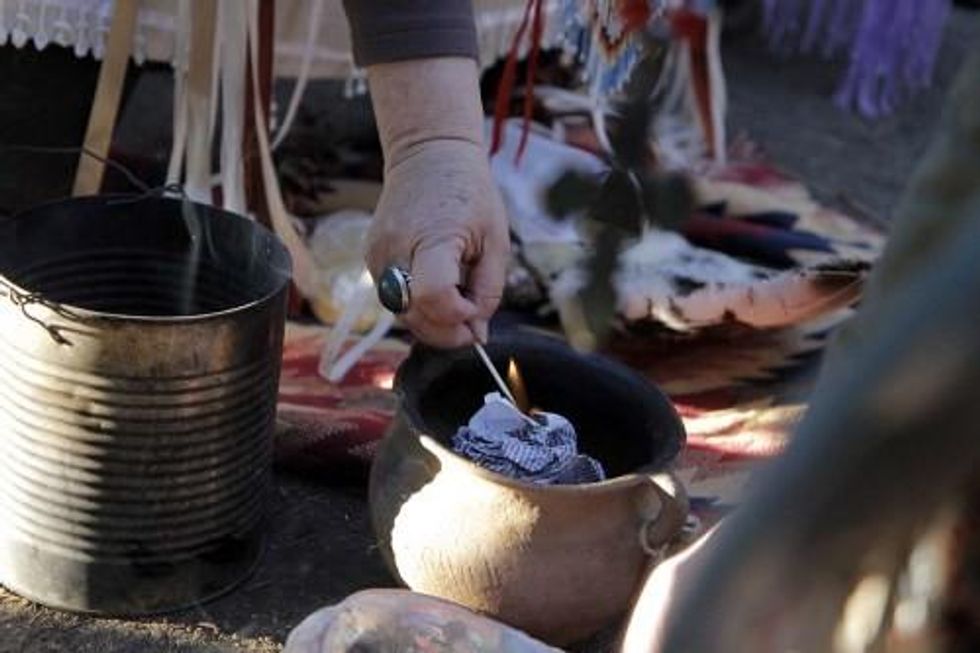
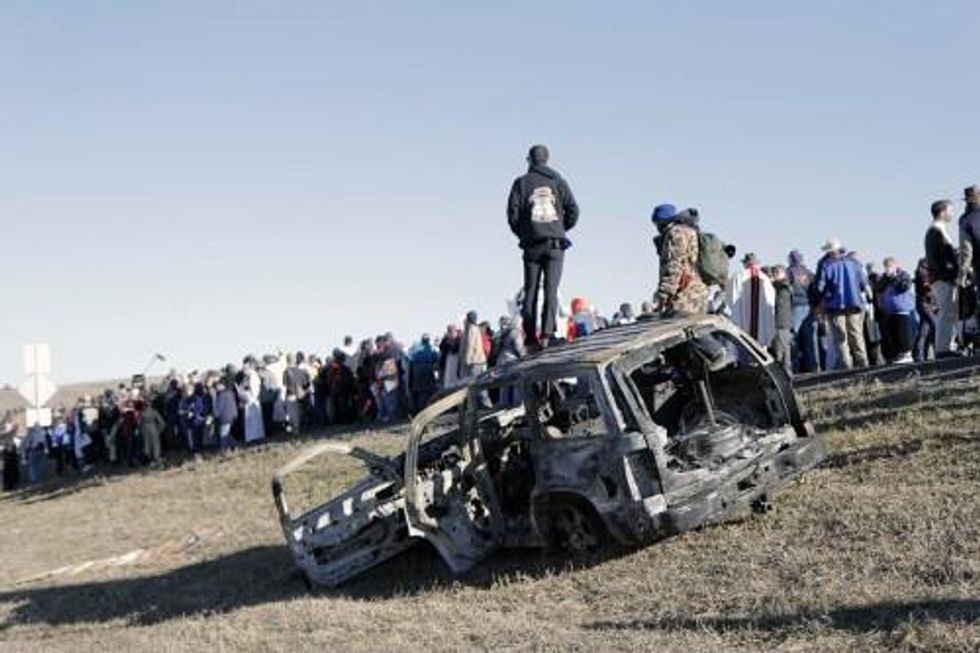
Dear Common Dreams reader, The U.S. is on a fast track to authoritarianism like nothing I've ever seen. Meanwhile, corporate news outlets are utterly capitulating to Trump, twisting their coverage to avoid drawing his ire while lining up to stuff cash in his pockets. That's why I believe that Common Dreams is doing the best and most consequential reporting that we've ever done. Our small but mighty team is a progressive reporting powerhouse, covering the news every day that the corporate media never will. Our mission has always been simple: To inform. To inspire. And to ignite change for the common good. Now here's the key piece that I want all our readers to understand: None of this would be possible without your financial support. That's not just some fundraising cliche. It's the absolute and literal truth. We don't accept corporate advertising and never will. We don't have a paywall because we don't think people should be blocked from critical news based on their ability to pay. Everything we do is funded by the donations of readers like you. Will you donate now to help power the nonprofit, independent reporting of Common Dreams? Thank you for being a vital member of our community. Together, we can keep independent journalism alive when it’s needed most. - Craig Brown, Co-founder |
In a "historic" show of interfaith solidarity, 500 clergy members prayed along the banks of North Dakota's Cannonball River on Thursday where they "bore witness with the Standing Rock Sioux Nation," which has faced intimidation, violence, and arrests for protecting their sacred land and water supply from the threats of a massive oil pipeline.
According to the Episcopal News Service, "The interfaith group spent more than five hours on site, marching, singing hymns, sharing testimony, and calling others to join them in standing with the more than 200 tribes who have committed their support to the Sioux Nation as they protest the route of the Dakota Access Pipeline (DAPL)."
Later, roughly a hundred protesters and clergy members held a prayer circle on the lawn of the North Dakota state Capitol in Bismarck, forcing the police to order a lock-down of the building. "Highway Patrol Lt. Tom Iverson said 14 people were arrested in the Capitol's judicial wing for refusing to leave the building. Iverson said the protesters, who were holding a sit-in and singing prayer hymns, faced disorderly conduct charges," AP reported.
The below video was taken by local news station KRYR-TV:
Caro Gonzales, a Native American activist, told reporters that the water protectors had come to the Capitol to deliver a letter to Gov. Jack Dalrymple in support of the tribe and to ask "why he has ordered riot police to engage in police brutality at Standing Rock." Afterwards, a group of roughly 100 protesters marched from the Capitol to the governor's residence, where they were met by "dozens of riot police," Gonzales said.
Throughout the months-long standoff, Dalrymple, a Republican, has routinely sided with the pipeline company. After falsely declaring that the water protectors were risking public safety by engaging in "unlawful acts," he called a state of emergency, which paved the way for an increasingly aggressive and overblown police response to the peaceful protests.
On Wednesday, about 100 police in riot gear fired mace, pepper spray, and rubber bullets at point-blank range at water protectors praying waist-deep in water. The group of roughly 300 protectors had attempted to cross the Cannonball River to pray for the threatened land on the opposite side.
The week prior, more than 140 water protectors were arrested after police conducted a military-style raid of their encampment. Armed with tanks, a sound cannon, an armored truck, and bulldozer, the scene was described as "all-out war...waged on Indigenous protectors."
During the day of prayer Thursday, the clergy members marched to the bridge that was the site of last week's attack and "ceremonially burned a copy of a 600-year-old document," AP reported. Known as the Doctrine of Discovery, "the document from the 1400s sanctioned the taking of land from Indigenous peoples."
"It was very moving to be there in solidarity," said Philadelphia-based Bishop Dwayne Royster. "I wanted to be present as an African-American clergy person to let the people at Standing Rock understand that we as African Americans need them to know that we stand with them in their fight."
Similar acts of solidarity, particularly by people of faith, have grown in recent days. On Wednesday, nine rabbis, rabbinical students, and Jewish community members were arrested in Philadelphia for staging a civil disobedience action at a downtown TD Bank, one of the biggest financiers of the pipeline project. Nearly 300 rabbis have signed a statement in opposition to Dakota Access.
As the pipeline's construction edges closer to the Missouri River, which the Standing Rock Sioux is hoping to protect, with little hope of abatement, pipeline opponents worldwide are planning a mass Day of Action on Nov. 15, asking the U.S. Army Corps of Engineers and the incoming U.S. president "stop the Dakota Access Pipeline--and all those after it."
The call to action reads:
The Army Corps fast-tracked the Dakota Access Pipeline without proper consultation, and as a result, bulldozers are approaching Standing Rock as we speak. But with coordinated, massive demonstrations across the country, we'll make it clear that this powerful movement will not allow the Obama administration or the incoming President to sacrifice Indigenous rights, our water, or our climate--they must reject this pipeline.
Episcopal News Service photographer Lynette Wilson shared a number of moving photographs from the day of prayer.





In a "historic" show of interfaith solidarity, 500 clergy members prayed along the banks of North Dakota's Cannonball River on Thursday where they "bore witness with the Standing Rock Sioux Nation," which has faced intimidation, violence, and arrests for protecting their sacred land and water supply from the threats of a massive oil pipeline.
According to the Episcopal News Service, "The interfaith group spent more than five hours on site, marching, singing hymns, sharing testimony, and calling others to join them in standing with the more than 200 tribes who have committed their support to the Sioux Nation as they protest the route of the Dakota Access Pipeline (DAPL)."
Later, roughly a hundred protesters and clergy members held a prayer circle on the lawn of the North Dakota state Capitol in Bismarck, forcing the police to order a lock-down of the building. "Highway Patrol Lt. Tom Iverson said 14 people were arrested in the Capitol's judicial wing for refusing to leave the building. Iverson said the protesters, who were holding a sit-in and singing prayer hymns, faced disorderly conduct charges," AP reported.
The below video was taken by local news station KRYR-TV:
Caro Gonzales, a Native American activist, told reporters that the water protectors had come to the Capitol to deliver a letter to Gov. Jack Dalrymple in support of the tribe and to ask "why he has ordered riot police to engage in police brutality at Standing Rock." Afterwards, a group of roughly 100 protesters marched from the Capitol to the governor's residence, where they were met by "dozens of riot police," Gonzales said.
Throughout the months-long standoff, Dalrymple, a Republican, has routinely sided with the pipeline company. After falsely declaring that the water protectors were risking public safety by engaging in "unlawful acts," he called a state of emergency, which paved the way for an increasingly aggressive and overblown police response to the peaceful protests.
On Wednesday, about 100 police in riot gear fired mace, pepper spray, and rubber bullets at point-blank range at water protectors praying waist-deep in water. The group of roughly 300 protectors had attempted to cross the Cannonball River to pray for the threatened land on the opposite side.
The week prior, more than 140 water protectors were arrested after police conducted a military-style raid of their encampment. Armed with tanks, a sound cannon, an armored truck, and bulldozer, the scene was described as "all-out war...waged on Indigenous protectors."
During the day of prayer Thursday, the clergy members marched to the bridge that was the site of last week's attack and "ceremonially burned a copy of a 600-year-old document," AP reported. Known as the Doctrine of Discovery, "the document from the 1400s sanctioned the taking of land from Indigenous peoples."
"It was very moving to be there in solidarity," said Philadelphia-based Bishop Dwayne Royster. "I wanted to be present as an African-American clergy person to let the people at Standing Rock understand that we as African Americans need them to know that we stand with them in their fight."
Similar acts of solidarity, particularly by people of faith, have grown in recent days. On Wednesday, nine rabbis, rabbinical students, and Jewish community members were arrested in Philadelphia for staging a civil disobedience action at a downtown TD Bank, one of the biggest financiers of the pipeline project. Nearly 300 rabbis have signed a statement in opposition to Dakota Access.
As the pipeline's construction edges closer to the Missouri River, which the Standing Rock Sioux is hoping to protect, with little hope of abatement, pipeline opponents worldwide are planning a mass Day of Action on Nov. 15, asking the U.S. Army Corps of Engineers and the incoming U.S. president "stop the Dakota Access Pipeline--and all those after it."
The call to action reads:
The Army Corps fast-tracked the Dakota Access Pipeline without proper consultation, and as a result, bulldozers are approaching Standing Rock as we speak. But with coordinated, massive demonstrations across the country, we'll make it clear that this powerful movement will not allow the Obama administration or the incoming President to sacrifice Indigenous rights, our water, or our climate--they must reject this pipeline.
Episcopal News Service photographer Lynette Wilson shared a number of moving photographs from the day of prayer.




